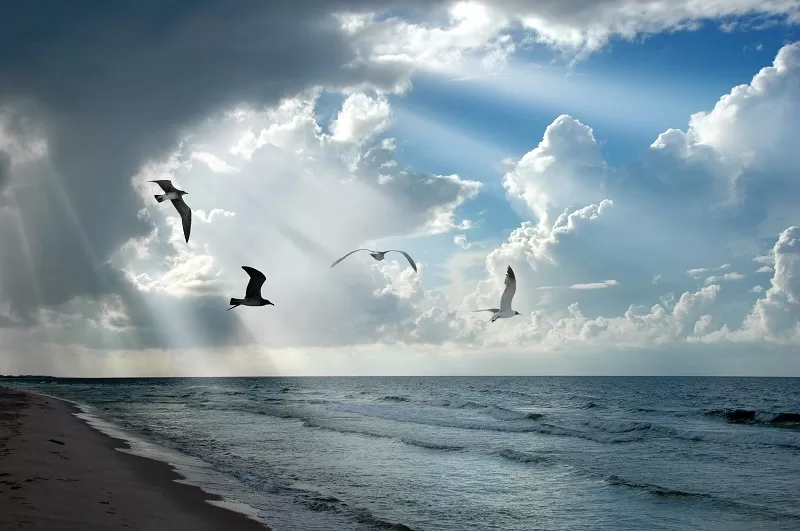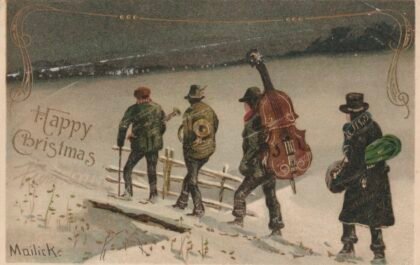The Coastwatchers chronicles the adventures of James Ellis Anderson, a young boy from Illinois sent to live with his eccentric aunt in Malibu during WWII. In the tradition of fiction from that period, TNT is presenting this original story by TNT Editor Suzanne Guldimann in serial installments. The first chapter, which introduces James and his Aunt Maddie, debuted in our November 4, 2022 issue and is available online. Please join us, as we travel back in time to January 1942.

“Have you been to our beach yet?” Jessie asked. She had to shout because the wind was still blowing hard. “Let’s go this way. I’ll show you the trail.”
It was a bright, clear, warm Saturday morning, and the wind was like a live thing, some kind of very large animal. It was exhilarating just being out in it.
Jessie led me down the creek path. The canyon opened out and the stream left the boulders behind and flowed instead through gravel and pebbles.
There was a strong, rank smell of celery plants, and something else, like incense.
“Mule fat,” Jessie said, pointing to clumps of tall, ranging plants. “It’s a horrible name, but I love the smell.”
We followed the trail past a house. A canoe was pulled up in the garden, but the water didn’t look deep enough to use it.
“That one is ours,” Jessie said with pride. “It hasn’t rained enough this year, but when we have a wet winter you can paddle on the creek. It’s fun. Dan—that’s my brother—showed me how. We used to go together sometimes. Your Aunt Maddie told me your Father is in the Navy,” she continued. “I just found out my brother is, too. My father wasn’t very happy about it. He’s still raging. Dan sent a telegram saying he was leaving school to sign up.”
“Why is your father angry?” I asked.
“Father wanted him to finish school first. He just started college in September, but now he’s leaving.”
“I wish I was old enough to go,” I said. “It feels wrong to be here all safe and everything while my father and your brother and all of the other soldiers and sailors and everyone is out there fighting.”
“But we can help,” Jessie said. “We can help watch the coast in case enemy submarines attack. I’ve thought about it a lot. They have a coast watch in Australia, I read about it in the paper. We can be our own Malibu coast watch.”
That sounded like a great idea.
We came around a bend in the creek bed, and there was the ocean we were going to watch. We had to cross under the highway in a kind of concrete culvert thing. Once out on the other side my heart lifted. Ocean not just in view but a short walk from home. It was so blue and so perfect. There was a sandbar like a dam on the beach that turned the creek into a small lagoon. The water in that lagoon was still and calm. On the other side of the sandbar was the wild sea. Wind-blown waves crashed. Spray flew, making rainbows in the morning sun.
That’s the Palos Verdes Peninsula,” Jessie shouted, pointing east. “And that’s Catalina Island. That thing like the neck and head of a sleeping dinosaur is Point Dume,” she explained, pointing west.
I wasn’t listening. She had to explain it all again later. The ocean was the most exciting thing I’d ever seen. Pacific means peaceful, but it wasn’t peaceful at all, it was wild and powerful and beautiful. Dried seaweed crunched underfoot. The sand and spray, driven by the wind, hurt my face, and got in my eyes, but I didn’t care. It was wonderful.
Jessie had to drag me away, or I might have stood there all day.
We made plans all the way home on how we could help guard the bay from invaders.
“And we can write a newsletter for all of the neighbors, to let them know what’s happening,” Jessie concluded, triumphantly.
“Do you think we really could?” I felt a surge of excitement at the thought, tempered by a wave of doubt.
“Of course we can. I got a miniature printing press for Christmas this year. We can print it on that. I’m going to be a writer, you know, just like Maddie, only I want to be a journalist, not a screenwriter.”
“Aunt Maddie isn’t a writer, is she?” I was astonished.
Jessie looked at me as if I was a kind of turnip. “How did you not know that? She’s famous.She doesn’t do films anymore, but she writes essays and poetry and novels and things.
I was stunned. “I didn’t know, I said. “We weren’t in touch after my mother died. Father, well, his side of the family, didn’t like to talk about Aunt Maddie. They didn’t approve of her. Father never even talked about my mother much,” I said, hesitantly. “And all he ever said about Aunt Maddie is that she was—is—not respectable, but Aunt Charlotte always said she was mad, you know, crazy.”
Jessie hooted with derision. “Mad? My father says she’s brilliant. He says she can write anything. She wrote like 20 screenplays back in the silent movie days. They still call her in to fix scripts that aren’t working. She’s amazing.”
I thought about the movie posters on the walls at the house, and the typewriter. “I never knew,” I said, sheepishly. “I never asked.”
Jessie shook her head at my stupidity.
“But why would writing be bad?” I asked. “I mean, what’s wrong with Aunt Maddie writing for a living? I know my father doesn’t approve when I write—he says I have to get my head out of the clouds and my feet on the ground—but that’s because he wants me to be a doctor like him.”
“I don’t know what she’s done that your family thinks is bad.” Jessie shrugged. “It can’t be too bad, or they wouldn’t have sent you here. Some people don’t think we’re respectable either because my father makes movies and has been married three times. I don’t think it means much. Who cares what those kinds of people think? Although, I guess it’s harder when it’s your own family that thinks that. Why don’t you ask Maddie, if it bothers you?”
“I suppose I should,” I said.
But I didn’t, not that day. The mail that afternoon brought a short note from Father. He was being shipped out to Hawaii. That brought me back down to earth. For a little while I had felt like I was in a dream or on some kind of vacation far away from the rest of the world, but we were still at war. Father, and Jessie’s brother Dan, and all of those men I had seen traveling west on the train were going into danger. A lot of them wouldn’t be coming back again. It made everything else seem a lot less important.




